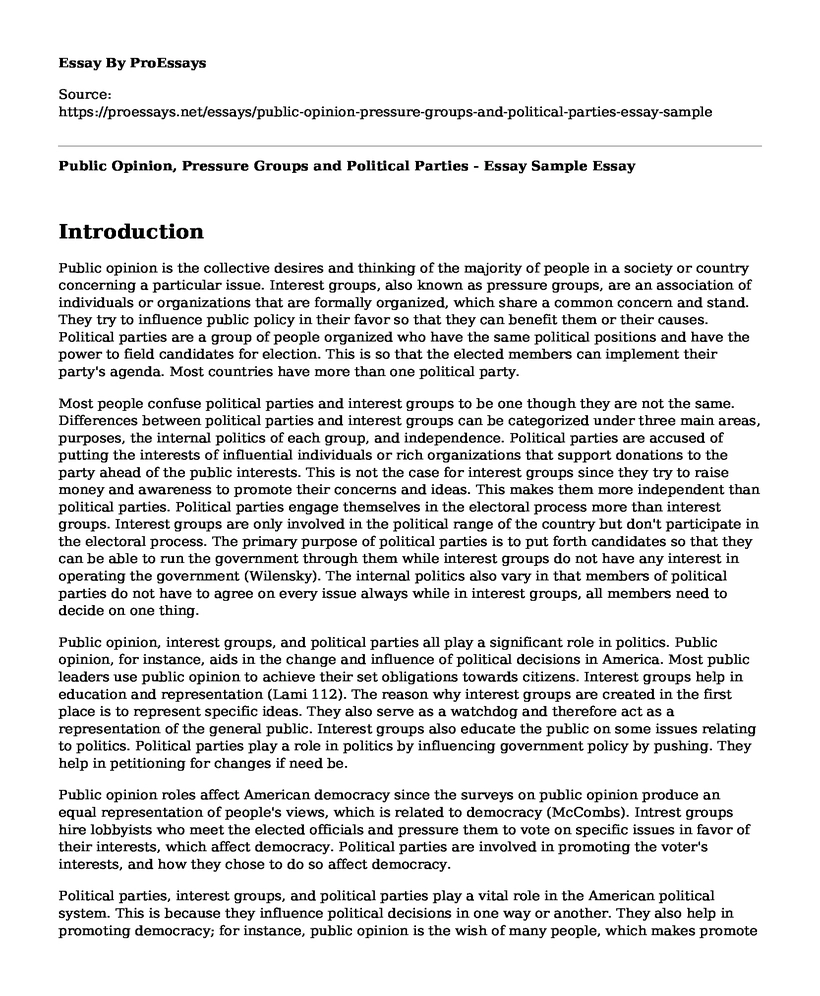Introduction
Public opinion is the collective desires and thinking of the majority of people in a society or country concerning a particular issue. Interest groups, also known as pressure groups, are an association of individuals or organizations that are formally organized, which share a common concern and stand. They try to influence public policy in their favor so that they can benefit them or their causes. Political parties are a group of people organized who have the same political positions and have the power to field candidates for election. This is so that the elected members can implement their party's agenda. Most countries have more than one political party.
Most people confuse political parties and interest groups to be one though they are not the same. Differences between political parties and interest groups can be categorized under three main areas, purposes, the internal politics of each group, and independence. Political parties are accused of putting the interests of influential individuals or rich organizations that support donations to the party ahead of the public interests. This is not the case for interest groups since they try to raise money and awareness to promote their concerns and ideas. This makes them more independent than political parties. Political parties engage themselves in the electoral process more than interest groups. Interest groups are only involved in the political range of the country but don't participate in the electoral process. The primary purpose of political parties is to put forth candidates so that they can be able to run the government through them while interest groups do not have any interest in operating the government (Wilensky). The internal politics also vary in that members of political parties do not have to agree on every issue always while in interest groups, all members need to decide on one thing.
Public opinion, interest groups, and political parties all play a significant role in politics. Public opinion, for instance, aids in the change and influence of political decisions in America. Most public leaders use public opinion to achieve their set obligations towards citizens. Interest groups help in education and representation (Lami 112). The reason why interest groups are created in the first place is to represent specific ideas. They also serve as a watchdog and therefore act as a representation of the general public. Interest groups also educate the public on some issues relating to politics. Political parties play a role in politics by influencing government policy by pushing. They help in petitioning for changes if need be.
Public opinion roles affect American democracy since the surveys on public opinion produce an equal representation of people's views, which is related to democracy (McCombs). Intrest groups hire lobbyists who meet the elected officials and pressure them to vote on specific issues in favor of their interests, which affect democracy. Political parties are involved in promoting the voter's interests, and how they chose to do so affect democracy.
Political parties, interest groups, and political parties play a vital role in the American political system. This is because they influence political decisions in one way or another. They also help in promoting democracy; for instance, public opinion is the wish of many people, which makes promote democracy if it is acted upon.
Works Cited
Lami, Roland. "Impact of social groups in political discourse." International Letters of Social and Humanistic Sciences 52 (2015): 111-121.
McCombs, Maxwell. Contemporary public opinion: Issues and the news. Routledge, 2017.Wilensky, Harold L. "Leftism, Catholicism, and Democratic Corporatism:: The Role of Political Parties in Recent Welfare State Development." Development of Welfare States in Europe and America. Routledge, 2017. 345-383.
Cite this page
Public Opinion, Pressure Groups and Political Parties - Essay Sample. (2023, Mar 14). Retrieved from https://proessays.net/essays/public-opinion-pressure-groups-and-political-parties-essay-sample
If you are the original author of this essay and no longer wish to have it published on the ProEssays website, please click below to request its removal:
- The Corrupt Bargain Essay Example
- Zero Tolerance Policies in Schools Essay Example
- The Fifth Amendment - Essay Sample
- How to Improve Democracy in America - Research Paper
- Essay Example on Environment, Economic Growth, Policies: An Analysis of Sweden
- Paper Example on Universities Uphold Environmental Sustainability: ACUPCC's Commitment to Climate Change
- Paper Example on Ancient Athens: Aristocratic Rule & Poor Oppression







